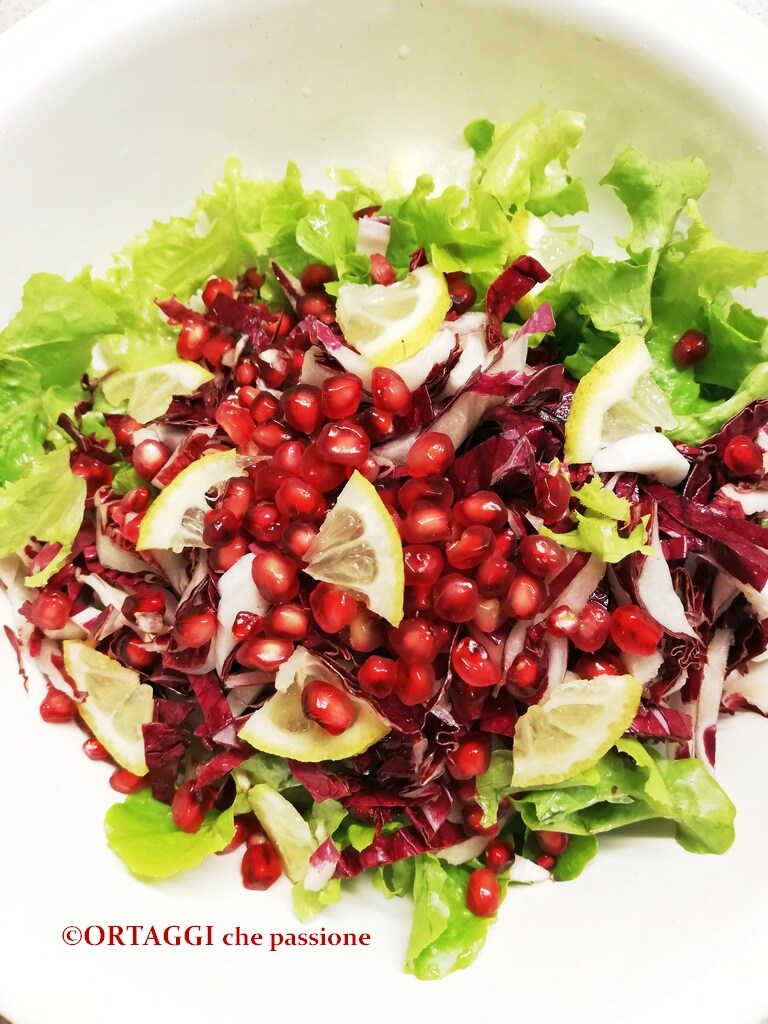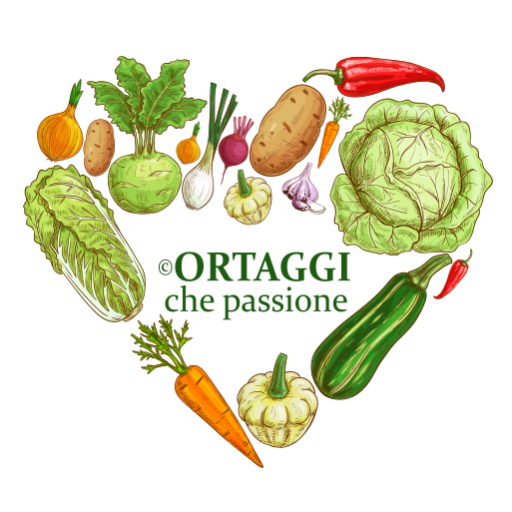Salad with pomegranate is a great colorful side dish for the autumn and winter season, a nice idea as a light appetizer for the holidays and Christmas.
Did you know?
Pomegranate is the name of the plant, while pomegranate is the name of the fruit; although commonly the name “pomegranate” is often used for both the tree and its fruit as indicated by the Accademia della Crusca or by Treccani. Other names for the fruit are: granate apple, pomegranate, granate apple. The edible parts are the seeds (arils or its internal seeds) which are gelatinous, transparent in color, and slightly tart.
What is the meaning of the pomegranate?
The meaning of the pomegranate varies in different cultures and traditions. Generally, it is often associated with concepts such as fertility (due to the numerous small seeds contained in the fruit), abundance (because the seeds are numerous), maturity (because the seeds are surrounded by a hard skin, like a metaphor for the wisdom acquired with experience), love (due to its intense red color) and spirituality (in some religions it is a symbol of divine wisdom).
SEASON
#pomegranate – from September to December (depending on the variety)
citrus fruits – from October to March depending on the variety
Recipes for cold season salads

- Difficulty: Easy
- Cost: Cheap
- Preparation time: 10 Minutes
- Portions: 2
- Cooking methods: No cooking
- Cuisine: Healthy
- Seasonality: Autumn, Winter
- Energy 75.24 (Kcal)
- Carbohydrates 7.26 (g) of which sugars 4.39 (g)
- Proteins 1.53 (g)
- Fat 5.13 (g) of which saturated 0.73 (g)of which unsaturated 0.14 (g)
- Fibers 2.04 (g)
- Sodium 396.61 (mg)
Indicative values for a portion of 125 g processed in an automated way starting from the nutritional information available on the CREA* and FoodData Central** databases. It is not food and / or nutritional advice.
* CREATES Food and Nutrition Research Center: https://www.crea.gov.it/alimenti-e-nutrizione https://www.alimentinutrizione.it ** U.S. Department of Agriculture, Agricultural Research Service. FoodData Central, 2019. https://fdc.nal.usda.gov
Salad with Pomegranate
- 3.5 oz lettuce (or salad)
- 1.75 oz radicchio (or endive, sugar loaf)
- 1.75 oz pomegranate
- to taste lemon (or orange – use untreated citrus fruits)
- 1 tbsp extra virgin olive oil
- to taste fine salt
for an extra touch, add a little ground or flaked chili pepper
Tools
- Cutting board
- Knife with smooth blade
- Bowl large
Salad with Pomegranate
Wash the vegetables, tear the salad into pieces with your hands, and slice the radicchio thinly with a knife, place everything in a large bowl.
Deseed the pomegranate arils and add them to the salad.
Season with a little salt, citrus juice (or thin slices with their peel, only if organic or untreated), and extra virgin olive oil.
CHRISTMAS SALAD with pomegranate
INGREDIENTS
– lettuce, arugula or baby spinach
– citrus fruits (peeled raw or in segments) or cubes or thin slices of apple
– walnut kernels, hazelnut grains or almond flakes
– pomegranate arils
PROCEDURE
Season with salt, oil, and balsamic vinegar or apple cider vinegar glaze.
Season with salt, oil, and balsamic vinegar or apple cider vinegar glaze.
Also try the red beet carpaccio.
————————
What goes well with pomegranate?
– Fresh seasonal fruit: grapes, clementine segments, Satsuma Miyagawa mandarin, grapefruit, or pieces of avocado, kiwi, apples, or pears.
– Chopped, diced, or flaked dried fruit: almonds, walnuts, hazelnuts, pine nuts, pistachios.
– Seasonal vegetables: white or red cabbage (shredded), fennel (shredded), carrots (julienned), spinach or baby kale sprouts (tender leaves).VEGETARIAN IDEAS
– diced cheese, such as caciotta, feta, mozzarella, quartirolo, scamorza or cottage cheese
– boiled eggsOMNIVORE IDEAS
– anchovies, sardines, shrimp, mackerel, tuna
– pieces of grilled or boiled chicken, boiled caponCuriosities
Curiosities
HEALTH BENEFITS
What is pomegranate good for?The pomegranate fruit has various beneficial properties: it is anti-inflammatory, antibacterial, antifungal, antioxidant, and hypotensive. These positive characteristics are due to the synergistic effect between phytonutrients (polyphenols), vitamins, and minerals it contains. Among these substances are quercetin, ellagic acid, vitamin C, and folates. The most important minerals are iron, potassium, and manganese. Among these, potassium has a hypotensive effect and is therefore positive in cases of hypertension.
Dr. La Civita, nutritionistWhich organ benefits from pomegranate?
Pomegranate is mainly beneficial for the heart and cardiovascular system due to its antioxidants, which can help reduce blood pressure and improve cholesterol levels.
Can people with constipation eat pomegranate?
Pomegranate is rich in fibers that can help improve intestinal regularity. However, it is important to introduce it gradually into the diet to avoid discomfort. Always drink enough water, as it is important for helping digest fibers. In general, having a balanced diet rich in fibers from various sources can help prevent or alleviate constipation.
CONTRAINDICATIONS
What are the side effects of pomegranate?The side effects of pomegranate can include diarrhea, heartburn, allergies, drug interactions, kidney problems, and potential interferences with diabetes. These effects are usually related to specific situations or excessive consumption. Pomegranate can be consumed in moderation as part of a balanced diet.
When should you not eat pomegranate?
Avoid consuming pomegranate if you are allergic to it or have severe kidney problems. Consult a doctor if you are taking specific medications or have dietary concerns in case of diabetes or other medical conditions.

